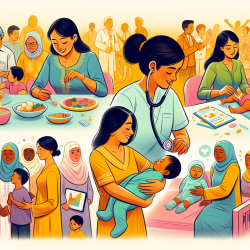Introduction
As speech-language pathologists, we continuously strive to enhance our practices to achieve the best outcomes for our clients. The research article titled "Gulf War Servicemen and Servicewomen: The Long Road Home and the Role of Health Care Professionals to Enhance the Troops' Health and Healing" offers valuable insights that can be applied to our field. This blog explores how the findings from this research can inform our practices, particularly when working with children who have experienced trauma or have family members in the military.
Understanding the Impact of Trauma
The research highlights the psychological and physical challenges faced by military personnel, including traumatic brain injuries (TBI) and post-traumatic stress disorder (PTSD). These conditions can have profound effects on communication abilities, which are crucial for successful reintegration into civilian life. As practitioners, understanding the complexities of these conditions allows us to tailor our interventions to address specific communication deficits resulting from trauma.
Data-Driven Approaches
Incorporating data-driven approaches is essential in speech-language pathology. The research underscores the importance of thorough assessments and evidence-based interventions. By leveraging data, we can identify patterns and predictors of communication challenges in children who have experienced trauma or have military family backgrounds. This enables us to implement targeted strategies that address individual needs, ultimately improving therapy outcomes.
Collaboration with Healthcare Professionals
The research emphasizes the need for collaboration between healthcare professionals to provide comprehensive care. As speech-language pathologists, collaborating with psychologists, occupational therapists, and other specialists ensures a holistic approach to treatment. This interdisciplinary collaboration is particularly important when addressing the multifaceted needs of children affected by military-related trauma.
Encouraging Further Research
The research article serves as a call to action for further investigation into the long-term effects of military-related trauma on communication abilities. By conducting longitudinal studies and gathering robust data, we can better understand the trajectory of communication recovery in affected individuals. This knowledge will inform the development of innovative interventions and support systems that promote resilience and successful reintegration.
Conclusion
Incorporating insights from military healthcare research into speech-language pathology practices can significantly enhance outcomes for children affected by trauma. By understanding the impact of conditions like TBI and PTSD, adopting data-driven approaches, and fostering collaboration with other healthcare professionals, we can provide more effective and comprehensive care. Continued research in this area will further refine our practices and ensure that we are equipped to meet the unique needs of our clients.
To read the original research paper, please follow this link: Gulf War Servicemen and Servicewomen: The Long Road Home and the Role of Health Care Professionals to Enhance the Troops' Health and Healing.










